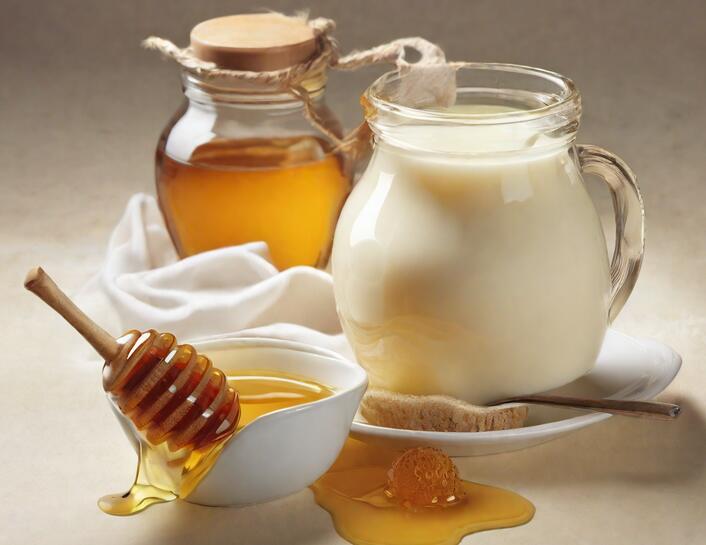Milk and honey have been used for centuries as natural remedies for various health issues. Individually, both honey and milk offer a range of benefits. However, when combined, they create a powerful concoction that can enhance overall health and wellness. This article will explore the 16 benefits and versatile uses of milk with honey.
Milk and Honey Nutritional Profile
Honey, often referred to as nature’s sweetener, is packed with essential vitamins and minerals. It contains vitamins B2, B3, B5, and B6, as well as vitamin C and various minerals like iron, magnesium, and potassium. Additionally, honey is rich in antioxidants, which help fight inflammation and protect against oxidative stress.
On the other hand, milk is a nutritional powerhouse, providing essential nutrients necessary for overall health. It is an excellent source of calcium, which promotes strong bones and teeth, as well as vitamin D, which aids in calcium absorption. Milk is also a good source of protein, essential for muscle growth and repair.
Here’s a nutritional profile for milk and honey:
| Nutrient | Milk (1 cup) | Honey (1 tablespoon) |
|---|---|---|
| Calories | 103 | 64 |
| Protein | 8 grams | 0 grams |
| Fat | 2.4 grams | 0 grams |
| Carbohydrate | 12 grams | 17 grams |
| Sugar | 12 grams | 17 grams |
| Calcium | 276 mg | 0 mg |
| Vitamin D | 115 IU | 0 IU |
| Iron | 0.1 mg | 0.1 mg |
| Potassium | 366 mg | 11 mg |
| Sodium | 107 mg | 2 mg |
Please note that these values are approximate and can vary depending on the brand and type of milk or honey.

16 Benefits and Uses of Milk with Honey
1. Boosts Immunity
The combination of honey and milk is known to strengthen the immune system. The antimicrobial properties of honey combined with the vitamins and minerals in milk can help fight off infections and illnesses.
In addition, Honey contains natural enzymes that produce hydrogen peroxide, which acts as an antiseptic. This, along with the antioxidants found in honey, can help boost the immune system. Additionally, milk is rich in vitamins A and D, as well as zinc, which are all essential for maintaining a healthy immune system.
2. Provides Energy
Honey is a natural source of carbohydrates, while milk contains proteins and healthy fats. Consuming honey with milk can provide a quick energy boost. This makes it an excellent choice for athletes or individuals needing an energy pick-me-up.
The carbohydrates in honey are easily digestible and can provide an immediate source of energy. Milk, on the other hand, contains proteins that are essential for muscle repair and growth. The combination of carbohydrates, proteins, and fats in honey with milk can provide sustained energy and prevent energy crashes.
3. Aids Digestion
The enzymes present in honey and the soothing properties of milk can aid digestion and alleviate digestive issues such as indigestion, bloating, and constipation.
Honey contains enzymes like diastase, amylase, and invertase, which can help break down carbohydrates and improve digestion. Additionally, honey has prebiotic properties that can act as a food source for beneficial gut bacteria.
Milk contains lactase, the enzyme needed to digest lactose, making it easier for individuals with lactose intolerance to consume milk with honey. Consuming a glass of warm milk with honey before bed can promote better digestion overnight.
4. Improves Sleep Quality
The combination of honey and milk is known for its calming and sleep-inducing properties. Drinking a cup of warm milk with honey before bedtime can help relax the body and mind, promoting better sleep quality.
Milk contains tryptophan, an amino acid that can help regulate sleep patterns. Tryptophan is converted into serotonin, a neurotransmitter that helps regulate sleep and mood.
Honey can increase the production of serotonin by providing the necessary amino acids. Additionally, honey has been found to increase the production of melatonin, a hormone that regulates sleep-wake cycles.

5. Soothes Sore Throat
The antibacterial properties of honey combined with the soothing effect of milk can provide relief from a sore throat. Gargling with warm milk and honey can help reduce inflammation and alleviate discomfort.
Honey contains hydrogen peroxide, which has antimicrobial properties and can help kill bacteria in the throat. Milk, on the other hand, can help soothe the throat lining and provide a coating effect. When combined, honey and milk can provide relief from sore throat symptoms.
6. Promotes Bone Health
Calcium is essential for maintaining strong bones, and both honey and milk are good sources of this vital mineral. Regularly consuming honey with milk can help prevent osteoporosis and improve bone density, especially when combined with weight-bearing exercises.
Incorporating this combination into your diet is particularly beneficial for growing children, teenagers, and postmenopausal women. You can add honey and milk to your morning oatmeal or enjoy a glass of honey milk as a midday snack.
7. Hydrates the Skin
Honey and milk can be used topically to moisturize and hydrate the skin. Applying a mixture of honey and milk as a face mask can help nourish the skin, leaving it soft, supple, and glowing. Honey has humectant properties. This means it helps retain moisture in the skin, keeping it hydrated.
Milk, on the other hand, contains fats that can help moisturize the skin and prevent dryness. The combination of honey and milk can provide deep hydration and nourishment to the skin, making it an excellent choice for dry skin.
8. Fights Acne
The antibacterial properties of honey combined with the cleansing properties of milk make this combination effective in fighting acne. Applying a mixture of honey and milk to the affected area can help reduce inflammation and prevent acne breakouts.
Honey has been used for centuries for its antimicrobial properties, which can help kill bacteria that cause acne. Milk contains lactic acid, which acts as a gentle exfoliant and can help remove dead skin cells and unclog pores. The combination of honey and milk can help reduce acne-causing bacteria and promote clearer, healthier skin.

9. Supports Weight Loss
Drinking a glass of warm milk with honey in the morning can help kickstart your metabolism and aid in weight loss. The combination of honey and milk keeps you satiated for longer, reducing cravings and promoting healthy eating habits.
Honey contains natural sugars that can provide a quick source of energy without causing a spike in blood sugar levels. The presence of protein in milk can help promote feelings of fullness and reduce appetite.
Additionally, honey has been found to help regulate hunger hormones, which can aid in weight loss efforts.
10. Relieves Menstrual Cramps
The soothing properties of milk combined with the anti-inflammatory effects of honey can help alleviate menstrual cramps. Drinking warm milk with honey during menstruation can provide relief and reduce discomfort.
Milk contains calcium, which can help relax muscles and reduce cramping. Honey, on the other hand, has natural anti-inflammatory properties, which can help reduce pain and inflammation. The combination of milk and honey can provide natural relief from menstrual discomfort.
11. Enhances Brain Function
Milk is rich in nutrients like protein, vitamins, and minerals that support brain health. Honey contains antioxidants that can protect the brain from oxidative stress.
Consuming honey with milk can enhance cognitive function and improve memory. Protein is essential for the production of neurotransmitters, which are involved in brain function and communication.
The vitamins and minerals found in milk, such as B vitamins and calcium, contribute to overall brain health. In addition, Honey’s antioxidants can help protect the brain against damage caused by free radicals, promoting optimal brain function.
12. Improves Heart Health
The combination of honey and milk can help maintain heart health. Honey contains antioxidants that reduce the risk of heart disease, while milk’s calcium content supports healthy blood pressure levels.
Antioxidants are found in honey, such as flavonoids and phenolic compounds. It has been shown to reduce the risk of heart disease by reducing inflammation and oxidative stress.
Calcium, found in milk, is essential for maintaining healthy blood pressure levels and proper heart function. The combination of honey and milk can help support overall cardiovascular health.

13. Strengthens Hair
Honey and milk can be used in hair masks to strengthen and nourish the hair. The proteins in milk and the moisturizing properties of honey can help reduce hair breakage, improve hair texture, and add shine.
Milk contains proteins, such as casein and whey, which are essential for the strength and structure of the hair. The moisturizing properties of honey can help hydrate the hair and prevent dryness and breakage. The combination of honey and milk can help improve the overall health and appearance of the hair.
14. Relieves Allergies
Consuming honey produced locally can help alleviate seasonal allergies. The small amounts of pollen present in honey can act as a natural desensitizer, reducing allergy symptoms over time.
Local honey contains traces of pollen from local plants, which can help desensitize the body to allergens in the environment. By consuming small amounts of local honey regularly, the body may become less reactive to pollen, leading to a reduction in allergy symptoms.
15. Supports Muscle Recovery
Honey is known for its anti-inflammatory properties, while milk provides essential proteins for muscle recovery. Consuming honey with milk after a workout can aid in muscle repair and reduce exercise-induced inflammation.
The carbohydrates in honey can help replenish glycogen stores and provide energy for muscle recovery. Additionally, honey’s anti-inflammatory properties can help reduce exercise-induced inflammation.
Milk contains high-quality proteins that are essential for muscle repair and growth. The combination of honey and milk can support muscle recovery and enhance athletic performance.
16. Boosts Overall Nutrition
The combination of honey and milk provides a wide range of essential nutrients, including vitamins, minerals, proteins, and antioxidants. Incorporating honey with milk into your diet can boost overall nutrition and promote overall well-being.
Honey is rich in antioxidants, which can help protect the body against oxidative stress and reduce the risk of chronic diseases. Milk is a good source of calcium, protein, and other essential nutrients that are necessary for overall health. The combination of honey and milk can provide a nutrient-rich addition to your diet.

Precautions and Considerations
1. Potential Allergies and Intolerances
While honey and milk offer numerous benefits, it is essential to be aware of potential allergies and intolerances. Some individuals may be allergic to honey or lactose intolerant, which can cause digestive discomfort.
If you experience any adverse reactions, such as hives, swelling, or digestive issues, it is best to consult with a healthcare professional and consider alternative options.
2. Best Time to Consume
The best time to consume honey with milk can vary depending on your goals and preferences. Some people prefer to consume it in the morning for an energy boost, while others find it more beneficial before bed to promote restful sleep.
Experiment with different timings to find what works best for you and aligns with your desired outcomes. Regardless of the time of day, incorporating honey with milk into your routine can provide numerous health benefits.
3. Choosing Quality Ingredients
When incorporating honey and milk into your diet, it is crucial to choose high-quality ingredients. Opt for raw or organic honey to ensure you are getting the maximum health benefits and avoid honey that has been heavily processed or mixed with artificial additives.
Similarly, select fresh, organic milk whenever possible to ensure you are consuming a nutritious and pure product. You can purchase honey from local beekeepers or farmers’ markets to support local businesses and enjoy the unique flavors of your region.
FAQs
1. What type of honey is best to use with milk?
While different types of honey offer various flavors and characteristics, any pure and high-quality honey can be used with milk. Some popular choices include raw honey, Manuka honey, and wildflower honey. Experiment with different types to find your preferred taste.
2. Can I use plant-based milk alternatives with honey?
Yes, you can certainly use plant-based milk alternatives, such as almond milk or oat milk, with honey. It is a great option for individuals who are lactose intolerant or follow a vegan lifestyle. Plant-based milk alternatives can provide similar creaminess and nutritional benefits as dairy milk.
3. How often should I consume honey with milk?
A: The frequency of consumption depends on your personal preferences and health goals. Enjoying honey with milk a few times a week can provide significant benefits, but it’s essential to listen to your body and make adjustments accordingly. As with any food, moderation is key.
4. Organic vs. Conventional
Organic milk is produced from cows that are raised on organic feed and have access to pasture. By opting for organic milk, you can enjoy the benefits of milk without the potential negative effects of added chemicals. However, if organic milk is not readily available, conventional milk can still provide essential nutrients.






